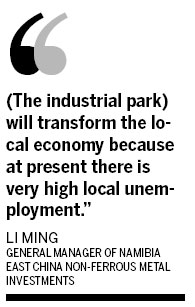Chinese firm in Namibia for the long haul
Updated: 2013-03-19 05:37
By Andrew Moody (China Daily)
|
||||||||
One Chinese mining company is set to transform the economy of one African country.
Namibia East China Non-ferrous Metal Investments is to bring steelmaking to Namibia in southwest Africa for the first time.
It is planning an industrial park around an iron ore mining facility at Kunene, 700 km northwest of Windhoek.
The park will also have a steel factory that will employ 10,000 local workers.
Li Ming, general manager of the company, which is a subsidiary of Nanjing-based ECE, says it is a 100-year investment and is expected to yield about 3 billion tons of iron ore.
"We are making the investment for the long term. It will transform the local economy because at present there is very high local unemployment."
The project is likely to involve funding from one of the major Chinese policy banks, and the Chinese investors will also be responsible for developing local infrastructure, including rail links and port development. "There is no steel manufacturer in Namibia and a lack of industry generally," Li says.
Not all Chinese mining investment companies are taking such an approach.

Qinglan Financial Group is purely an investor and has taken stakes in numerous mineral properties, including copper, gold, uranium, nickel, lead-zinc and potash projects in Africa.
Zhang Yan, executive partner of the Beijing-based company, says it is a good time to be a strategic investor.
"As a result of the current slump in the global mining industry, market values of mining companies have dropped significantly. Many of them still have valuable assets," he says.
Qinglan, which also has offices in Toronto and Hong Kong and whose biggest fund is the Blue Ocean Mining Investment Fund, is an increasingly dominant player in mining.
Zhang says his company's type of investment model is becoming increasingly the norm in the international mining sector and that it is no longer just about taking over mines and running them.
"In the international mining sector, most of the investments are being done by institutional investors such as funds."
Africa not only has basic commodities such as iron ore and copper but also nuclear fuel.
China Guangdong Nuclear Power acquired the world's fourth-largest supply of platinum when it bought the UK-listed Kalahari Minerals for $3.2 billion last year.
The company owned the Husab project mine in Namibia.
Wolfgang Yang, company secretary of Swakop Uranium, the subsidiary of the Guangdong company, said the mine - one of the largest ever investments in the country - was now in the construction phase.
"The uranium sector is a very closed field so everyone knows every major mine in the world, and so when this one is discovered, everyone was aware it was significant," he says.
Yang, now based in Namibia, says the company remains interested in investments elsewhere, not just in Africa.
Li at Namibia East China Non-ferrous Metal Investments says it is wrong to see Chinese mining companies as simply grabbing resources and not putting anything back.
"What we are doing will have a transformative effect on the local economy, provide much needed infrastructure and also - most important of all - bring good skilled jobs to the local community," he says.
(China Daily 03/19/2013 page17)

 In Photos: 7.0-magnitude quake hits Sichuan
In Photos: 7.0-magnitude quake hits Sichuan
 Li Na on Time cover, makes influential 100 list
Li Na on Time cover, makes influential 100 list
 FBI releases photos of 2 Boston bombings suspects
FBI releases photos of 2 Boston bombings suspects
 World's wackiest hairstyles
World's wackiest hairstyles
 Sandstorms strike Northwest China
Sandstorms strike Northwest China
 Never-seen photos of Madonna on display
Never-seen photos of Madonna on display
 H7N9 outbreak linked to waterfowl migration
H7N9 outbreak linked to waterfowl migration
 Dozens feared dead in Texas plant blast
Dozens feared dead in Texas plant blast
Most Viewed
Editor's Picks

|

|

|

|

|

|
Today's Top News
Live report: 7.0-magnitude quake hits Sichuan, heavy casualties feared
Boston suspect cornered on boat
Cross-talk artist helps to spread the word
'Green' awareness levels drop in Beijing
Palace Museum spruces up
First couple on Time's list of most influential
H7N9 flu transmission studied
Trading channels 'need to broaden'
US Weekly

|

|







